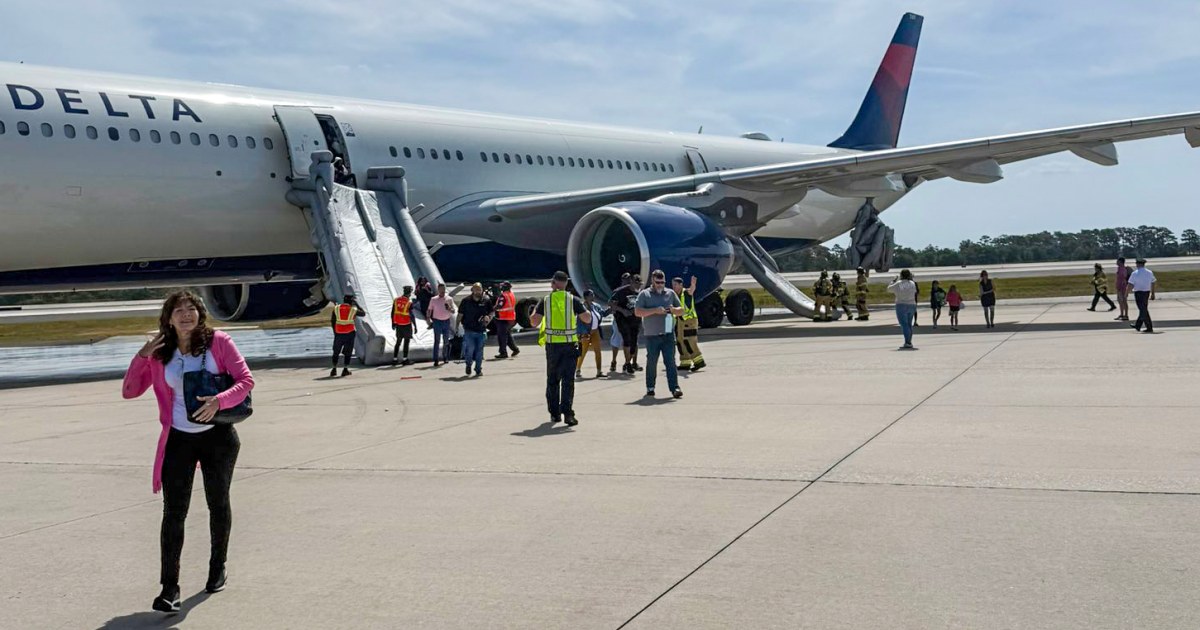Chaos at Orlando Airport as Delta Flight Evacuates Amid Engine Fire
Passengers aboard a Delta Air Lines flight experienced sheer terror on Tuesday afternoon when their aircraft’s engine caught fire during takeoff preparations at Orlando International Airport (MCO). Emergency slides deployed as 172 passengers and crew evacuated the Airbus A321, with three sustaining minor injuries. The incident, occurring at approximately 3:15 p.m. EDT, halted operations on the busy runway for nearly two hours as fire crews contained the blaze.
Eyewitness Accounts Describe Moments of Panic
“I heard what sounded like an explosion, then saw flames shooting from the left engine,” recounted passenger Michael Torres, 42, who was traveling with his family to New York. “People started screaming as the cabin filled with smoke. The flight attendants were absolute heroes—they kept everyone calm and moved us out in under 90 seconds.”
Cell phone footage obtained by our news team shows:
- Thick black smoke billowing from the engine nacelle
- Passengers sliding down emergency chutes with arms raised
- Ground crew members directing evacuees away from the aircraft
Aviation safety expert Dr. Lisa Yang of Embry-Riddle Aeronautical University noted: “This marks the seventh commercial aircraft engine fire incident in U.S. airspace this year—a 22% increase over 2022 statistics according to FAA reports. While modern aircraft have exceptional safety records, these events underscore why rigorous pre-flight checks are critical.”
Emergency Response and Airport Disruptions
Orlando Fire Department units arrived within four minutes of the 3:17 p.m. distress call, containing the fire before it reached the fuselage. Airport officials activated their emergency operations center, temporarily diverting 12 incoming flights while runway 18L/36R remained closed.
Key operational impacts included:
- 87 delayed departures across all airlines
- 2,400 passengers affected by cancellations
- $340,000 in estimated operational losses (per airport spokesperson)
Delta Airlines issued a statement confirming Flight 1736 had undergone “routine maintenance” the previous evening, with all systems showing nominal readings before departure. The carrier has since grounded five other A321neos from its fleet for precautionary engine inspections.
Investigators Focus on Engine Maintenance History
National Transportation Safety Board (NTSB) investigators arrived Wednesday morning to examine the Pratt & Whitney PW1100G-JM engine involved in the incident. Preliminary reports suggest a possible fractured fuel line, though officials caution this remains unconfirmed.
“We’re analyzing maintenance records spanning the engine’s entire 4,200-hour service history,” said NTSB lead investigator Carlos Mendez. “Modern turbofans don’t fail without warning—there are always precursor signs we look for in the data.”
Industry analysts highlight that:
- The PW1100G series has experienced 11 contained failures since 2020
- Average time between overhaul for this engine type is 12,000 hours
- Delta’s maintenance program scored 98.7% in last FAA audit (industry average: 96.2%)
Passenger Rights and Airline Accountability
Travel advocates urge affected passengers to document all expenses related to the disruption. Under DOT regulations, passengers may be entitled to:
- Full ticket refunds for canceled flights
- Compensation for overnight accommodations
- Reimbursement for essential items during extended delays
“While no amount of money compensates for trauma, airlines have clear obligations following operational emergencies,” said consumer rights attorney Amanda Pierce. “Passengers should photograph any injuries, save all receipts, and request incident reports while details remain fresh.”
Broader Implications for Aviation Safety
The Orlando incident occurs amid heightened scrutiny of aircraft maintenance practices. FAA data reveals:
- U.S. commercial airlines flew 16.3 million flights in 2022
- Mechanical issues caused 32% of all delays
- Engine failures represent 8% of mechanical incidents
Aviation manufacturers are increasingly turning to predictive analytics, with Pratt & Whitney recently announcing AI-powered vibration monitoring systems for its next-generation engines. Meanwhile, the NTSB continues advocating for mandatory cockpit video recorders—a proposal currently opposed by pilot unions.
Moving Forward: What Travelers Should Know
As Delta works to rebook displaced passengers, industry experts recommend:
- Reviewing airline safety records at FAA.gov
- Choosing morning flights when maintenance crews are freshest
- Paying attention to pre-flight safety briefings
“Statistically, flying remains safer than driving to the airport,” Dr. Yang emphasized. “But this incident reminds us why aviation safety requires constant vigilance from manufacturers, regulators, airlines, and passengers alike.”
The NTSB expects to release preliminary findings within 30 days. Passengers with relevant information may contact the investigation hotline at 1-800-XXX-XXXX. Those experiencing lasting trauma from the event can access crisis counseling through Delta’s customer care portal.
See more CNN Headline


